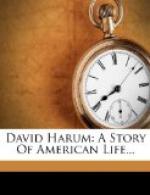He wakened somewhat earlier than usual to find that the thermometer had gone up, and the barometer down. The air was full of a steady downpour, half snow, half rain, about the most disheartening combination which the worst climate in the world—that of central New York—can furnish. He passed rather a busy day in the office in an atmosphere redolent of the unsavory odors raised by the proximity of wet boots and garments to the big cylinder stove outside the counter, a compound of stale smells from kitchen and stable.
After the bank closed he dispatched Peleg Hopkins, the office boy, with the note for Mrs. Cullom. He had abandoned his half-formed intention to revolt, but had made the note not only as little peremptory as was compatible with a clear intimation of its purport as he understood it, but had yielded to a natural impulse in beginning it with an expression of personal regret—a blunder which cost him no little chagrin in the outcome.
Peleg Hopkins grumbled audibly when he was requested to build the fires on Christmas day, and expressed his opinion that “if there warn’t Bible agin workin’ on Chris’mus, the’ ’d ort ter be”; but when John opened the door of the bank that morning he found the temperature in comfortable contrast to the outside air. The weather had changed again, and a blinding snowstorm, accompanied by a buffeting gale from the northwest, made it almost impossible to see a path and to keep it. In the central part of the town some tentative efforts had been made to open walks, but these were apparent only as slight and tortuous depressions in the depths of snow. In the outskirts, the unfortunate pedestrian had to wade to the knees.
As John went behind the counter his eye was at once caught by a small parcel lying on his desk, of white note paper, tied with a cotton string, which he found to be addressed, “Mr. John Lenox, Esq., Present,” and as he took it up it seemed heavy for its size.
Opening it, he found a tiny stocking, knit of white wool, to which was pinned a piece of paper with the legend, “A Merry Christmas from Aunt Polly.” Out of the stocking fell a packet fastened with a rubber strap. Inside were five ten-dollar gold pieces and a slip of paper on which was written, “A Merry Christmas from Your Friend David Harum.” For a moment John’s face burned, and there was a curious smarting of the eyelids as he held the little stocking and its contents in his hand. Surely the hand that had written “Your Friend” on that scrap of paper could not be the hand of an oppressor of widows and orphans. “This,” said John to himself, “is what he meant when ’he supposed it wouldn’t take me long to find out what was in my stocking.’”
* * * * *
The door opened and a blast and whirl of wind and snow rushed in, ushering the tall, bent form of the Widow Cullom. The drive of the wind was so strong that John vaulted over the low cash counter to push the door shut again. The poor woman was white with snow from the front of her old worsted hood to the bottom of her ragged skirt.




